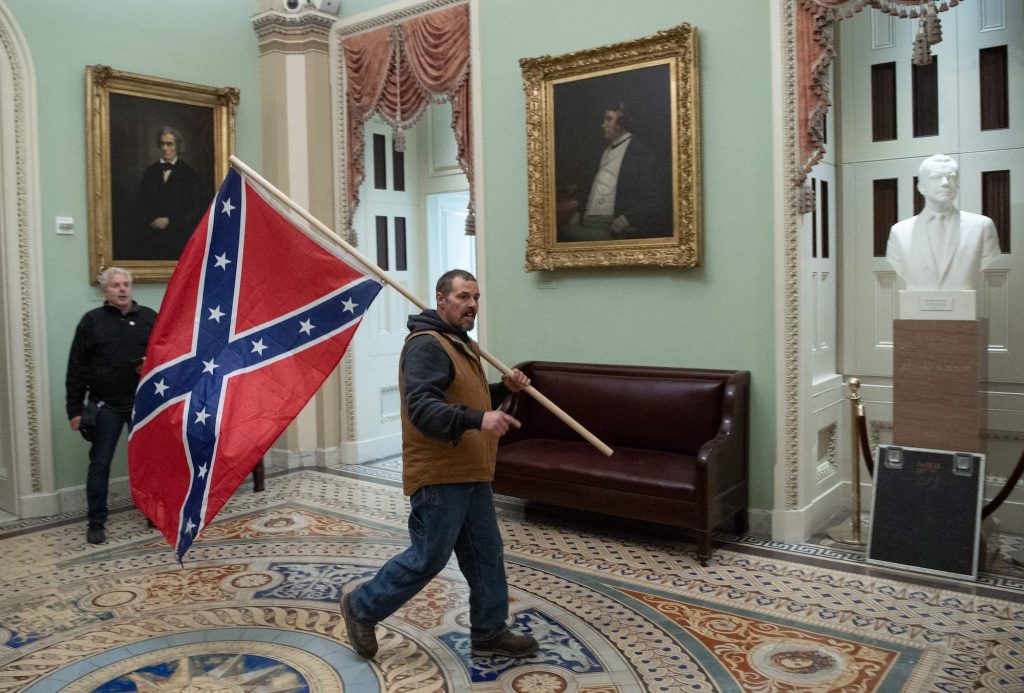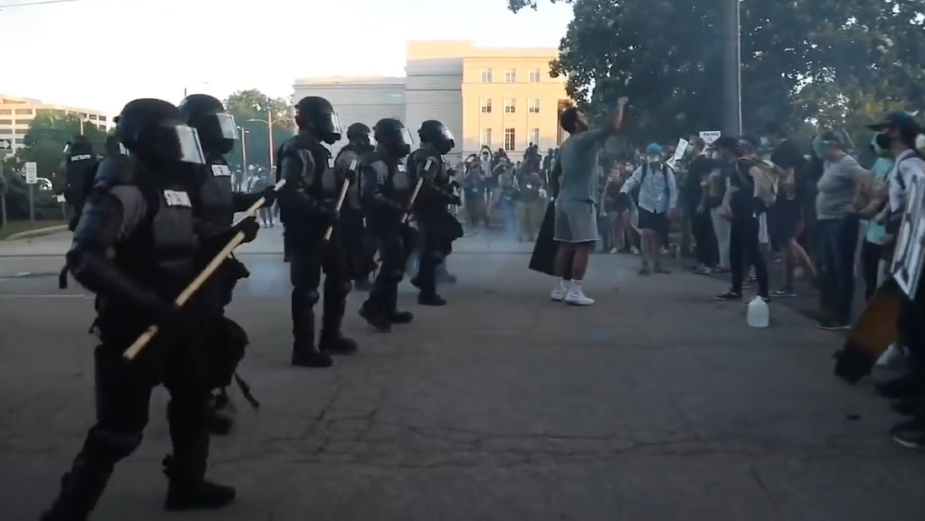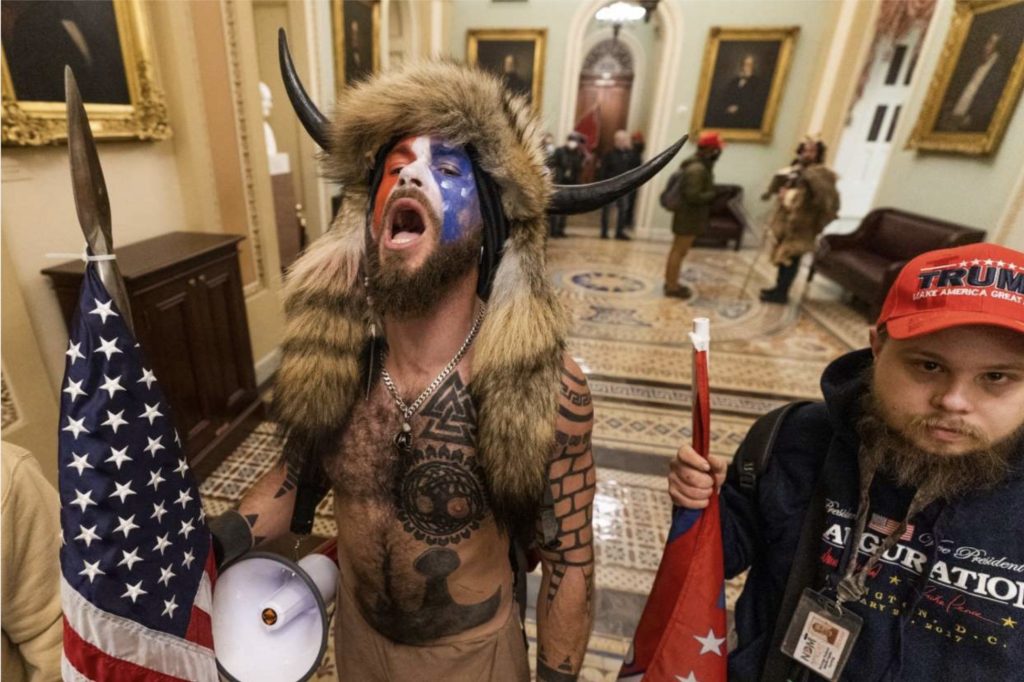The coup d’état attempt at the Capitol was a display of White privilege we should have seen coming.

On January the 6th, 2021, soon after we have enthusiastically welcomed the new year and the United States have welcomed their new government lead by elect-president Joe Biden and vice-president Kamala Harris, events unfolded which put the security of American democracy in question.
During a session of Congress certifying Joe Biden’s electoral victory, a group of pro-Trump rioters, armed with guns and bearing the infamous Stars and Bars, stormed into the Capitol in order to block Biden’s win.
“We just saw an attempted coup d’etat. Blame Trump. Blame his Republican enablers.” writes Eugene Robinson for The Washington Post.
Attempted coup d’état
On footages run across social media platforms, the rioters are seen breaking windows, looting the halls and chambers of the historic building, causing massive chaos and havoc. As a result, four people are dead and many more could have been, as we have learnt about pipe bombs and Molotov cocktails (a glass bottle filled with a flammable substance such as petrol, explosive in contact with fire) planted by the pro-Trump rally on the Capitol premises.
The Atlantic, The Washington Post, Foreign Policy and other news media urge to call this disturbance what it was – an attempted coup d’état. Coup d’état is the removal of an existing government, more often than not using violent measures. Rebel coups by definition involve “an organized, militarized group” (Cline Center for Advanced Social Research), which may not be the most accurate description of the disordered riot.
Nevertheless, the invasion combined with Donald Trump’s encouraging statements appearing on his Twitter account and in public speeches over weeks following the announcement of election results, meet the criteria of an attempted coup of which the aim it was to prevent a smooth, democratic transition of power. The morning on the 6th of January, Trump spoke the following words to the crowd of his supporters gathered outside the White House: „If you don’t fight like hell, you’re not going to have a country anymore,”.
Was it all really unpredictable?
We are talking about a certain climate of opinion which has been thriving among extremist republicans for four years during Donald Trump’s presidency. We are talking about the same four years of Trump’s activity in the media, from the broadcast network to Twitter and Facebook, including his most recent attempts to overturn the election results according to which his term ends on January 20, 2021.
His politics involved evoking the sense of strong, nationalistic pride and America’s ‘greatness’, while disregarding the existence of differences: of opinions, of political views, of races and their distinct experiences. He has successfully defended the privileged status of White Americans and his call for a literal, violent overthrow of the democratic system through an open rejection of the elected president is the very climax of Trump’s ‘pro-American’, pro-White vision.
Violent suppression of Black Lives Matter

Let us remember Trump’s government’s reaction to the 2020 Black Lives Matter protests, which were predominantly peaceful and legal, anti-racism and pro-justice gatherings of people, following the shootings of several Black men and women by police officers during a search, usually due to allegations of drug dealing.
Police response to the BLM protests across the country included unexplained arrests, usage of tear gas and violent suppression. When in June protests were held in Washington DC over the death of George Floyd, and the participants sat down on the Capitol’s front steps, grieving in silence, several rows of policemen wearing riot gear were placed before the main entrance to protect the building.
Gentle treatment of white suppremacists
Months later when white supremacists carrying flags of the Confederacy, an unrecognised breakaway state which advocated White supremacy and the institution of slavery, visibly armed with guns, stood in front of the Capitol threatening that they will enter, what was the response of the officers? They let them in. They removed barricades and stood aside, some of them even posed for selfies with the rioters, a moment visible on footage which was streamed live from inside the Capitol after the break-in.
The broadcasting service CNN has prepared a comparison of videos from the two events, showing, essentially, the way Black people’s calls for justice are throttled, while violence by White supremacists is met “without so much as a single pepper ball” (Brian Tyler Cohen on Twitter).
Trump: “You are very special”

Donald Trump openly referred to the BLM as a “symbol of hate” and called its protesters “thugs” and “terrorists”, but when commenting upon the events in the Capitol, to the crowd responsible for deaths of four people and planting bombs, he said: “go home in peace”, “you are very special” and “we love you”. He assured that their pride and faith in the righteousness of his and their common cause is not breached, and he would continue to do so if he remained president.
“As whites increasingly sense that their status in society is falling, white racial identity is becoming politicized. Trump’s promise to “make America great again” speaks to these anxieties by recalling a past in which white people dominated every aspect of politics and society.” write Eric D. Knowles and Linda R. Tropp for The Conversation.
Challenges for Joe Biden
Whether president Joe Biden will be able to overcome America’s racist legacy through his decision making and political performance remains in question, but he is now America’s best chance to end ‘the politics of white identity’, which rose dramatically following Trump’s victory in 2017.
The beginning of 2021, the attempted coup d’état in the heart of the US capital, must provoke reflections. When I think about Joe Biden, among other American politicians who have put it another way, saying “America is so much better than what we’re seeing today” (Twitter).
I like to recall the words of Canadian activist Janaya Khan, who commented upon Biden’s consolidating statement: “What if America isn’t better? What if the only way forward is to reckon with the ugliness that exists here?”.
Emilia Juchno, IB2